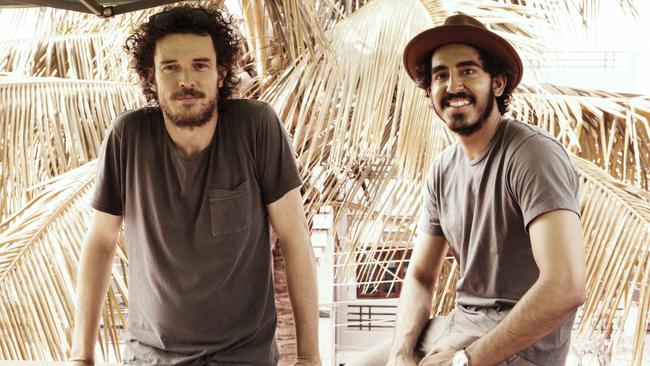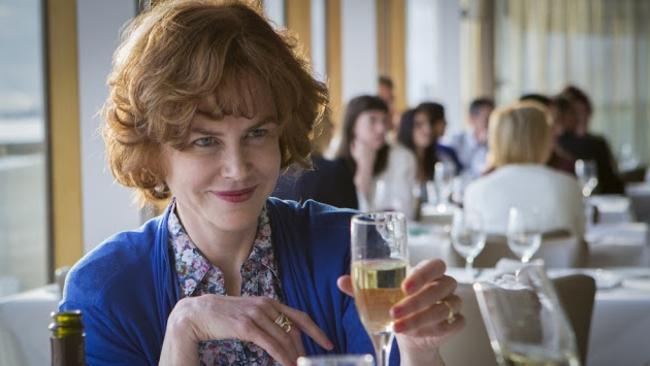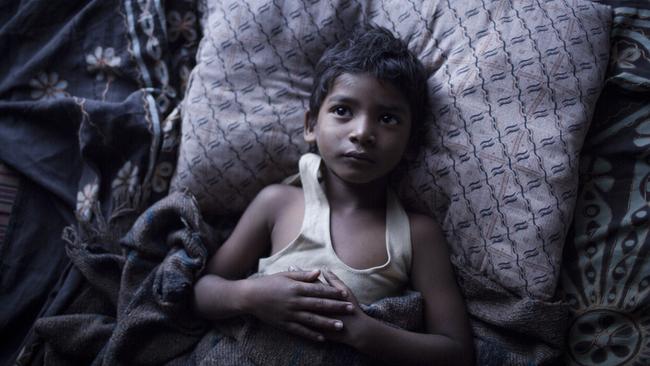Lion director Garth Davis on telling Saroo Brierley’s story
One man’s quest to find his biological mother captured all the qualities of the movies — and of life itself.

The story of Lion is an extraordinary one, and that’s part of the challenge of trying to tell it. “There’s a danger in the story in that it works as a paragraph, it looks great in an article,” says director Garth Davis. “But to make it into a film you have find something a lot deeper, you have to work out the complexities of it. We were well aware of that.”
Lion is based on the 2013 memoir of Saroo Brierley, born in India, who at the age of five accidentally became separated from his family, and ended up more than 1500km from home.
No one could work out who he was or where he came from. He was adopted by an Australian couple, John and Sue Brierley, and grew up in Hobart. Then, 25 years later, with the aid of Google Earth and his enduring childhood memories, he was able to identify Khandwa, the place he came from, and was reunited with his Indian birth mother.
Davis (making his feature debut after co-directing the TV series Top of the Lake) and scriptwriter Luke Davies (Candy, Life) felt they couldn’t make the film without spending time in both worlds. They also knew they needed to treat the story of those involved with respect and care.
Davis and Davies travelled to India, immersing themselves in location and detail. “I like to emotionally map the film,” Davis says. “It’s all about spending time in these places and imagining myself in the characters’ shoes ... It’s a very detailed surrender.”
Davies went to India and visited the places Davis did. “But the profoundly important thing that happened to me on that India trip,” he says, “was spending two or three hours with Kamla, Saroo’s biological mother.
“I had already read the book, was thunderstruck by it, excited by the notion that there was an amazing film waiting to be constructed out of this story. And I felt of course that the centre and the end result of the film was this mythic fable of reunification with the lost mother. I knew that in my head. But in the room with her, the whole film transferred into my gut. I started to feel the sorrow and the grieving and the stress and the trauma that stretched over 25 years.”

Davis saw the film taking place in two halves, “an external journey in the first half, and an internal story in the second half, but at a certain point along they become deeply intertwined”. He likes to create what he calls “rhymes”, small echoes and correspondences within the film that reflect the resonances and parallels between the two parts of the narrative.
The first half of Lion focuses on five-year-old Saroo, showing us the hardship of his life, but also the close, loving relationship with his mother and his older brother. We discover — in closely observed detail that eloquently depicts the child’s point of view — how Saroo got lost; how far he travelled; how resourceful he had to be to protect himself from the dangers facing young children on the streets. How it was that authorities were unable to establish his identity, how he was sent to an orphanage. And how the Brierleys came to adopt him and, later, another boy from India, Mantosh, with a far more troubled past than that of Saroo.
The filmmakers knew that if they were to spend half the film in India, they would need an extraordinary young actor to play five-year-old Saroo. They found him in Sunny Pawar, who had never acted before and hadn’t even seen a movie until he attended Lion’s US premiere. “We looked for about five months — it was a massive casting process,” Davis says. “We shortlisted down to a few hundred. And then one day this little boy was standing in the room and I thought, ‘Oh my god, that’s Saroo.’ You spend a lot of time building an image of this person, of what his attitude and personality would have been like to survive all these things, and then it just felt like it was him.”

One of the things they did to help Pawar connect with the story was to create a children’s book version of the script in Hindi, telling his part of the story; it was illustrated with location photos and images from rehearsal, and it gave him a way of connecting emotion and location.
Twenty-five years on, the second part of the story begins. We meet the adult Saroo, a good-natured Aussie embarking on a course in hotel management. He has a strong relationship with his adoptive parents, but he carries deep within him the history we have seen in the first half of the film. “Knowing what he’s holding inside as memories is an interesting and powerful thing,” Davis says.
Various factors contribute to his decision to embark on his search. When someone suggests he may be able to use new technology to track down his birthplace, Davis says Saroo “suddenly started to imagine, ‘If I had any chance of finding home, then I owe that to my family; it’s not about me any more. My mother must be still looking for me, my brother must still be looking for me.’ ”
As the adult Saroo, English actor Dev Patel (Slumdog Millionaire, The Newsroom) has a thoroughly credible Australian accent and conveys his character’s easygoing warmth but also his increasing obsession with his quest. “He’s so likable and approachable and he captured that leap really beautifully,” Davis says.
Nicole Kidman plays Sue Brierley as a vulnerable and forceful woman utterly committed to her two sons and to the adoption process. And in the course of finding his birth mother, Saroo discovers things about Sue, too.
Kidman had “a complete connection with the script”, Davis says. He recalls a meeting with her in New York: “The way she spoke about Sue and the film and the spiritualism and the determination and that idea of love when you’re an adoptive mother — she just got the material so deeply”.
Everyone thinks they know the ending of the story of Lion, with its miracle of technology and maternal restoration. But it’s an evolving narrative that was taking shape as the filmmakers were working on it. Davis was in India when the first meeting between the mothers took place, an encounter filmed by 60 Minutes. “It was so incredible,” Davis says. “I was there, gently in the shadows, when they needed me, to emotionally support the whole thing.”
Lion also allows us to see or imagine how there can be unresolved aspects of the story, emotional territories still to be negotiated. “The story is out in the world and the family is dealing with that,” Davis says. There are ramifications for everyone involved, including Saroo’s adoptive brother, Mantosh, who is now preparing, with the family’s support, to search for his birth parents. It’s a real-life story, but it’s also “a real, live story”, Davis says.
Lion opens in Australia on Thursday.



To join the conversation, please log in. Don't have an account? Register
Join the conversation, you are commenting as Logout